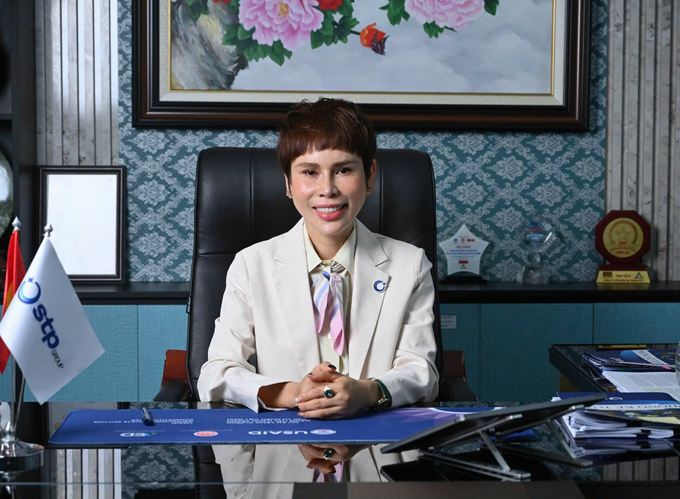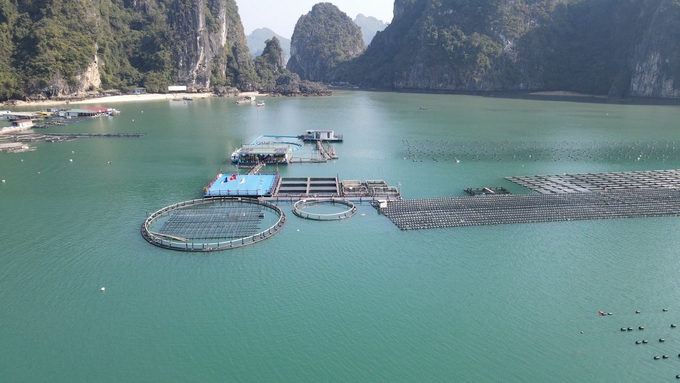November 28, 2025 | 06:54 GMT +7
November 28, 2025 | 06:54 GMT +7
Hotline: 0913.378.918
November 28, 2025 | 06:54 GMT +7
Hotline: 0913.378.918
For an extended period, cottonii seaweed, a tropical species frequently encountered in the Asia-Pacific region, has been acknowledged as an essential raw material in the production of cosmetics, pharmaceuticals, and sustenance.
Due to its brief harvest period, rapid development cycle, and burgeoning market demand, cottonii seaweed is becoming a high-value aquaculture product in Vietnam.
Vietnam's central and southern provinces have cultivated cottonii seaweed since the early 2000s. Khanh Hoa, Ninh Thuan, and Kien Giang, which are coastal regions with favorable natural conditions, promptly implemented specialized agricultural models to satisfy both domestic consumption requirements and export demands.

The company is the first in Northern Vietnam to effectively study and implement a Cottonii seaweed cultivation model in Van Don, according to Ms. Nguyen Thi Hai Binh, General Director of STP Group. Photo: HT.
The initiative, in conjunction with the Phat Co Aquaculture Cooperative, has attracted the focus of local producers and experts. Its objective is to safeguard the marine environment, diversify aquaculture products, and generate consistent income for the local community, all while generating substantial economic returns.
“We have been working on this model for five years,” Ms. Binh disclosed. While Northern Vietnam has significant potential for the cultivation of Cottonii seaweed, it also encounters obstacles, including less favorable weather and climate conditions in comparison to the central and southern regions, which restricts production.
The cultivation of Cottonii seaweed in the North was a challenging endeavor. Initially, the local producers were hesitant. Nevertheless, STP Group procured seed stock from Indonesia, Japan, and South Korea to facilitate trials, with the assistance of domestic and international experts. STP Group established the first cottonii seaweed farming chain in Van Don in partnership with the Fisheries Sub-Department and the Department of Agriculture and Rural Development of Quang Ninh, thereby demonstrating the model's viability.
Van Don's seaweed is not only appropriate for intercropping with other species, such as oysters, but it also satisfies high-quality standards. This integration, according to Ms. Binh, enables producers to simultaneously harvest oysters and seaweed, thereby enhancing the marine environment and generating dual income sources. The model also creates opportunities for experiential tourism, which contributes sustainable value to the area.
The initiative has encountered obstacles in spite of its accomplishment. Typhoon Yagi (Typhoon No. 3) resulted in the complete destruction of STP Group's seaweed crop and seed stock, necessitating the company's extensive reconstruction of its production chain. Nevertheless, the company was able to effectively reestablish its seaweed chain and continue to provide support to local producers by transferring technology and production processes, thanks to its accumulated experience and determination.

The integrated farm model combining seaweed cultivation, oyster farming, and experiential tourism by STP Group at Phat Co Island, Van Don district, Quang Ninh province. Photo: HT.
After nearly five years, numerous producers in Quang Ninh are enthusiastic about partnering with STP Group to implement new technologies and production methods for seaweed cultivation. The Van Don Sea Farming Association's recent establishment has resulted in a substantial transition from standard aquaculture practices to industrialization, with an emphasis on high-tech applications. The objectives of this organization are to safeguard the marine environment, support the expansion of the market and processing, and encourage the sustainable and secure development of the aquaculture sector in Van Don and Quang Ninh.
Ms. Binh declared, "STP Group's objective is to incorporate intercropping of seaweed and oysters into a five-star closed-loop seaweed production chain." Nevertheless, the most significant obstacle continues to be the preservation and packaging of seaweed products.
The company's leadership expressed their desire for additional assistance from both domestic and international experts in order to confront these obstacles. They also aim to establish the first Cottonii seaweed value chain in Northern Vietnam through STP, which will serve as a foundation for the industrialization of the seaweed industry on a national scale in the future.
According to the Institute of Aquaculture Research No. 3 in Nha Trang, there are more than 880 species of natural seaweed in Vietnam, of which 88 species have economic value. Vietnam has an estimated 900,000ha potential for seaweed farming.
Pharmaceutical and cosmetic industries utilize cultivated seaweed as a raw material. Numerous organizations manufacture bioplastic cups from seaweed. One can extract numerous compounds from seaweed for use in the food industry or dentistry.
Translated by Linh Linh

(VAN) On November 27, in the meeting with Minister Tran Duc Thang, Mayor Yin Yong shared Beijing’s experience to improve environment and air quality.

(VAN) After 30 years, both sides identified strategic areas of cooperation: sustainable production, increasing coffee value and training for farmers.
/2025/11/27/4910-4-164708_294.jpg)
(VAN) On the afternoon of November 27 in Beijing, Minister of Agriculture and Environment Tran Duc Thang held a working session with several major Chinese enterprises operating in the agriculture and environment sector.

(VAN) The Department of Animal Health issued a provisional guideline requesting local authorities to increase surveillance, collect samples for testing, and conduct epidemiological investigations according to the established procedure.

(VAN) The United Nations recommends that Vietnam utilize data and artificial intelligence to enhance early disaster warnings and reduce GDP losses by 3.2% in the context of climate change.

(VAN) On the morning of November 27 in Beijing, Minister Tran Duc Thang and the Deputy Commissioner General of the General Administration of Customs of China signed a protocol on fresh jackfruit exports.

(VAN) As floodwaters recede, a vast network of irrigation works across eastern Gia Lai is emerging in a state of severe disrepair, with extensive damage demanding urgent restoration ahead of the 2025-2026 winter-spring cropping season.